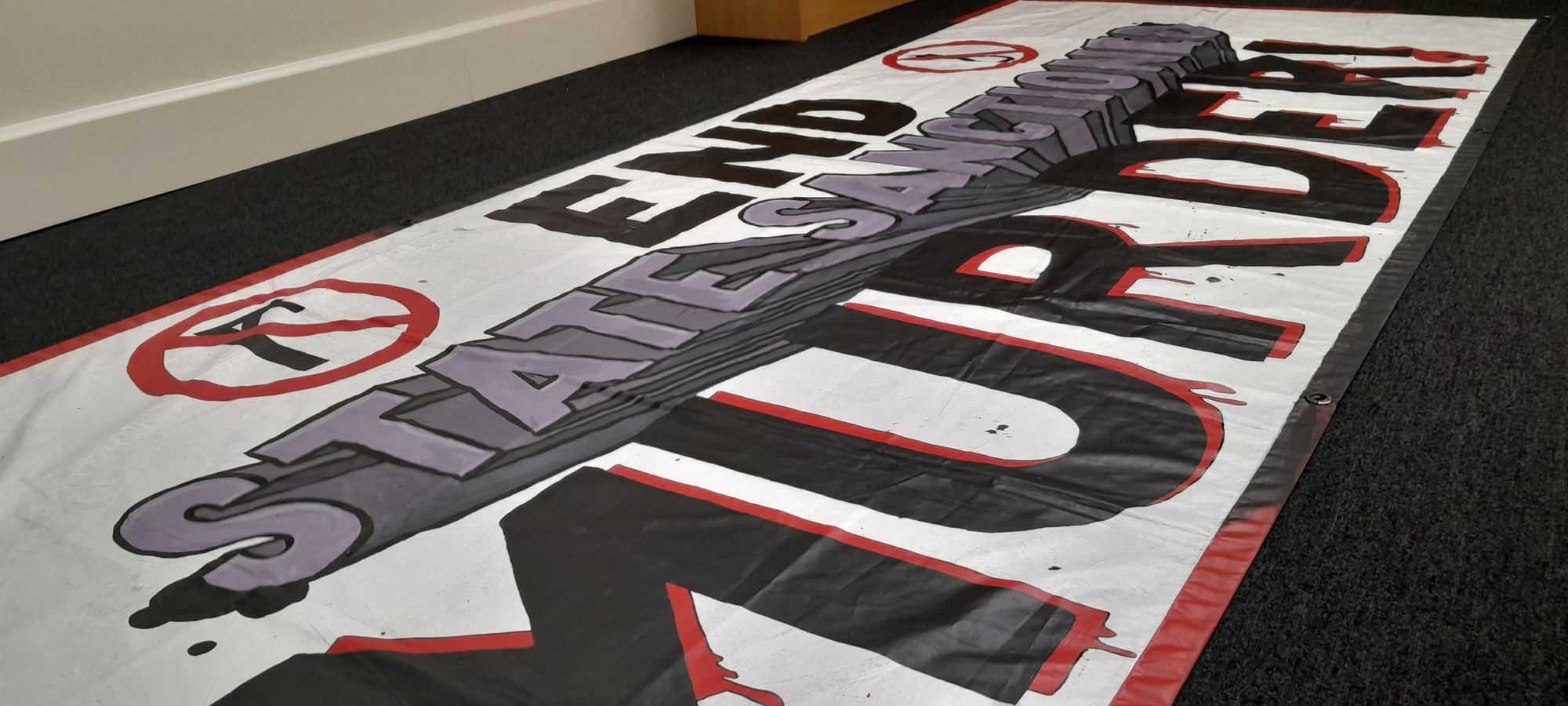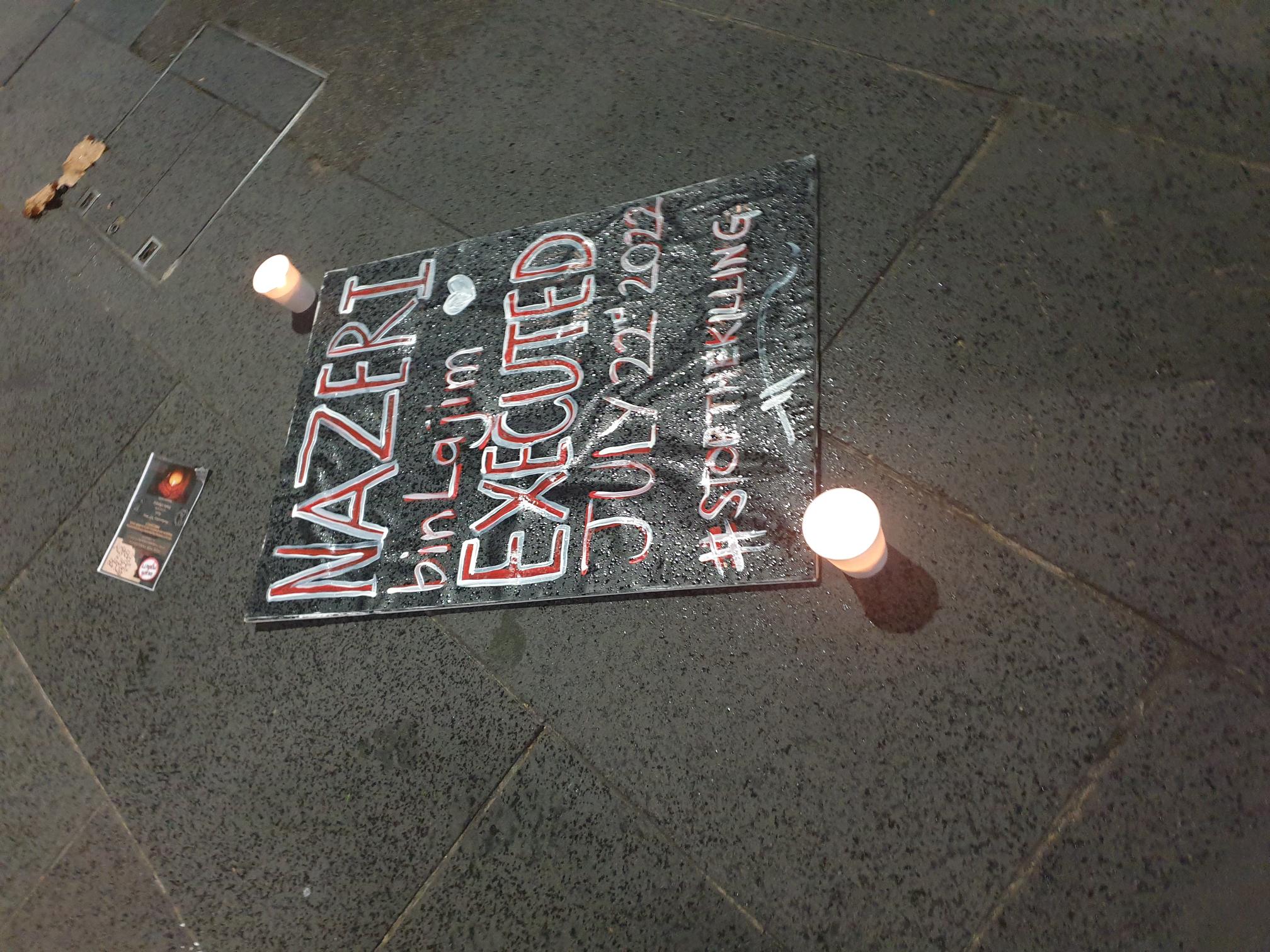Earlier this month, on 10 May, Harm Reduction Victoria held a public vigil in Melbourne for the men executed in Singapore in 2022 and 2023 (so far). They sent me photos from the event, and I asked Brit Chapman, their health promotion officer, if I could send her some questions, not just about the vigil but also about the organisation's work in the state of Victoria in Australia.

Could you please briefly introduce Harm Reduction Victoria and the work that you do?
Harm Reduction Victoria is a member-based organisation of people with lived and living experience of illicit drug use and the stigma and discrimination that comes with this. We provide innovative peer-led services, do health promotion work and advocate on issues that affect our community. We specialise in peer education and community empowerment across different drug using communities as well as train workers in the Alcohol and Other Drugs (AOD) sector so that they may be better at providing services for people who use drugs. You can find more detail about our different programs and check out our resources at www.hrvic.org.au

Drug possession, consumption, cultivation and trafficking are still criminalised in the state of Victoria. How does that affect the work that Harm Reduction Victoria does?
The current prohibitionist drug policy criminalises us and our community. This means that many people using illicit drugs within Victoria are apprehensive about accessing harm reduction services due to the fear of being identified as a person who uses illicit drugs and exposed to the stigma and discrimination they will likely experience due to this. We know that there are many people who we are unable to reach, who do not access any services. The stigma creates barriers to all healthcare access, meaning our healthcare needs often go unseen to, leading to sickness and unnecessary injury and death. Our communities and the work we try to do alongside them are constantly being disrupted and disempowered as people move in and out of the prison system and become further entrenched in cycles of ill-health and poverty.
It also means we are unable to provide or move toward some of the practical, evidence-based services that we are advocating for, such as drug checking, expansion of supervised drug consumption sites and community regulated safe supply programs.
The relationship between stigma and criminalisation also means that often we are not taken seriously by other organisations and individuals within the AOD sector. We must work harder for our work to be seen as legitimate. This also affects our funding — we are poorly funded and resourced and just do not have the capacity to do the work that needs to be done.
What is the public's response to Harm Reduction Victoria's work? Do you get people accusing you of enabling or facilitating drug use?
We don’t have a high profile amongst the broader public. Sometimes we receive criticism for our work, but we often receive supportive feedback and compliments too. If we are accused of encouraging drug use, we respond by saying that we neither condone nor condemn drug use. Part of working within a harm reduction framework is acknowledging that people have been using drugs for all sorts of reasons and across all cultures for thousands of years and they don’t need us to encourage them — people are going to use drugs (or not) regardless and that is not going to change. Instead, we educate people so that they are more empowered to make informed decisions that are healthy and right for them. Drug use in itself is usually not harmful, however things around it might be — such as blood borne viruses. If we can help people to avoid these harms or give them the tools to deal with existing harms, it benefits both people who use drugs and the wider community. Given that the contemporary “war on drugs” has not led to a decrease in illicit drug activity, it should be obvious by now that when people are told “don’t do drugs”, they stop listening to anything else that it said after it.
Honestly, people who think it’s okay to tell everyone else what to do all the time don’t listen to us anyway, so we don’t spend much time trying to change their minds — we would prefer to spend our energy where we can help people to make positive changes for themselves and their communities.

On 10 May, Harm Reduction Victoria held a public vigil for death row prisoners executed in Singapore for drug offences. What prompted you to organise this event?
On 26 April, Tangaraju was the first person to be hanged in Singapore in 2023, for a conviction relating to trafficking cannabis. Malay Singaporean grassroots human rights activists now living in Melbourne approached Harm Reduction Victoria for support to hold a public vigil to honour the memory of Tangaraju and others who have been murdered by the state for drug offences and protest the use of the death penalty for drug convictions. They also wanted us to help them promote a list of demands:
- Abolish the death penalty in Singapore
- Reform drug laws, changing the approach to drug use from criminalisation to a social and public health focus
- End policies that have disproportionately affected the most marginalised members of the community
- Replace the DRC (Drug Rehabilitation Centre) with proper physical and mental healthcare services for people who use drugs
We strive to amplify the voices of the most marginalised and silenced in our communities, so were more than happy to support with the organisation of the event and arrange speakers including David Limbrick (Member of the Victorian Legislative Council), Sara Kowal (Vice President of the Capital Punishment and Justice Project), Khepa (a long-time grassroots human rights activist who lived in Singapore and experienced incarceration whilst there) and Jane Dicka from Harm Reduction Victoria (on behalf of the Network of Asian People who Use Drugs and the International Network of People who Use Drugs).
In defending its use of the death penalty for drug offences, the Singapore government often points to stories of overdose deaths and other serious issues related to addiction. They say that capital punishment is a key part of their “harm prevention strategy” to keep Singapore safe from such problems. What would your response to such an argument be?
This simply is not true. If it were, then countries like Singapore who still implement the death penalty for drug-related offences would be seeing a significant drop in drug use and drug trafficking and distribution in their jurisdiction. Based on the fact that executions still take place decades after instituting the current policies, their logic does not make sense. In fact, in other jurisdictions where authorities have decriminalised some drug use and have moved away from punitive measures in favour of more human rights and health-based responses, data shows significant decreases in overdose deaths and other serious issues around the use of drugs such as blood-borne virus transmission. Clearly, a harm reduction response to drug use leads to better public health outcomes and a stronger sense of safety for all communities.


